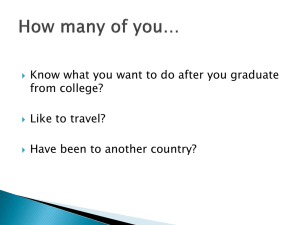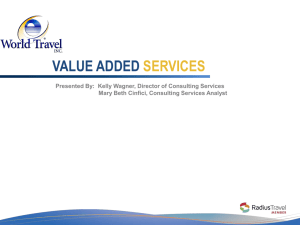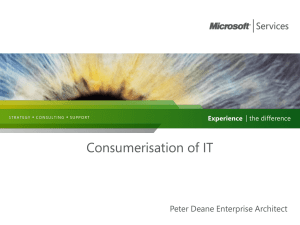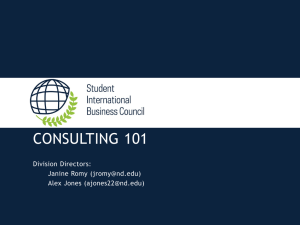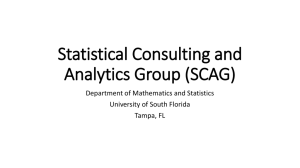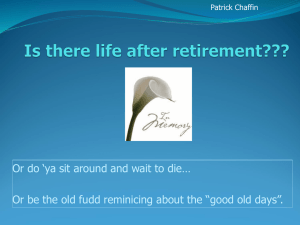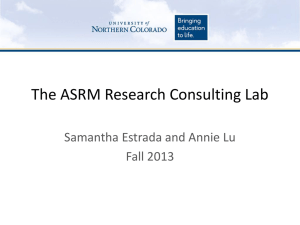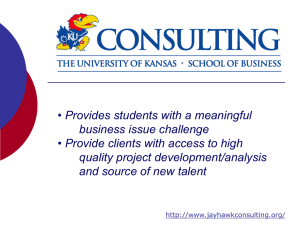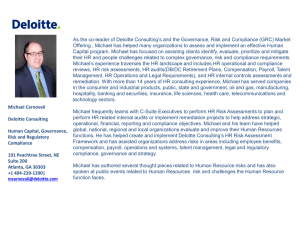HERE - Supportive Housing Providers Association
advertisement
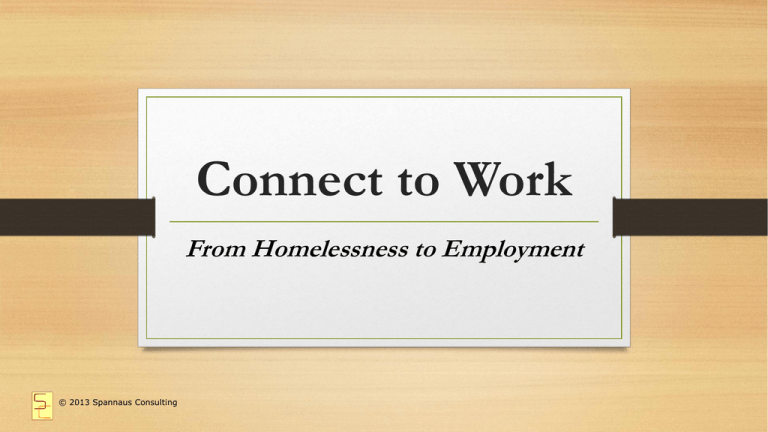
Connect to Work From Homelessness to Employment © 2013 Spannaus Consulting Purposes of the Study • Identify successful practices to move persons from homelessness to work • Forge local relationships between housing/service providers and employment/training providers • Promulgate promising practices © 2013 Spannaus Consulting Three Phases 1. Research 2. Relationship Building 3. Develop a Guide and Disseminate It © 2013 Spannaus Consulting The C2W Structure Advisory Council: • • • • • • • • • Nicole Amling, Chicago Alliance to End Homelessness Betsy Benito, CSH Mary Sue Cox, Illinois Department of Human Services David Harrison, Madison County CoC Funding: Butler Family Fund Grant to SHPA Dorothy McBride, Tri-County Opportunities Council, Rock Falls Staff Work: Steve Simmons, Chicago Jobs Council • Lore Baker, SHPA Executive Director Darsonya Switzer, Macon County CoC • Fred Spannaus, Lead Consultant Chris Warland, Heartland Alliance Joel Williams, Lake County CoC © 2013 Spannaus Consulting • Robyn McCoy, Workforce Consultant PHASE #1: RESEARCH • Identified 24 model programs; conducted 16 interviews • Observation & Advisory Council input • Isolated 80+ Promising or Evidence-Based Practices © 2013 Spannaus Consulting Two Basic Approaches: 1. Persons with severely limiting disabilities • Goal is not economic • Work is therapeutic • Fast attachment with supports SUPPORTED EMPLOYMENT IPS (INDIVIDUAL PLACEMENT & SUPPORT) © 2013 Spannaus Consulting 2. Persons who can support themselves through work • • • • Goal is economic Work is means to an end Step-by-step process More deliberate screening, training and placement assistance Six Common Elements Every High-Outcome Project Had a Majority of These Six Elements: • Right Scaling • Motivated Participants • One-on-One Interactions © 2013 Spannaus Consulting • Open-Ended Commitments • Collaboration • Long-Term Employer Partnerships 1. Right Scaling • Fit within size and capacity of the organization • Start small • Don’t overestimate how much time, money and energy can be invested © 2013 Spannaus Consulting 2. Motivated Participants • • • • People who want to work, work out better Screening for motivation Conversation shifts when desire to work is expressed Use evidence-based approaches: • Motivational interviewing • Harm reduction • Stages of change © 2013 Spannaus Consulting 3. One-on-One Interactions • High dosage of individual time • Individual practice • Limited use of classroom and online delivery of knowledge © 2013 Spannaus Consulting 4. Open-Ended Commitment • • • • No ending date Indeterminate length of enrollment Everyone stays in the program until they get adequate employment Report every day for skill building, job search, and/or volunteer duties © 2013 Spannaus Consulting 5. Interorganizational Collaboration • Great programs never go it alone • Great leaders who collaborate naturally • Active in local networks • Respected by peers • Focus on outcomes, not ownership or credit © 2013 Spannaus Consulting 6. Long-Term Employer Partnerships • Treat employers as full partners • Involve employers in planning and design • Solve employers’ problems – never ask for favors or charity • Respect business needs © 2013 Spannaus Consulting Other Learnings • People need purpose • “I work at…” • “I am a student at…” • “I volunteer at…” © 2013 Spannaus Consulting Other Learnings (cont’d) • Focus on strengths • Organizationally and individually • Distinct roles • Case manager (advocacy and service coordination) • Employment specialist (job and career issues) © 2013 Spannaus Consulting PHASE #2: RELATIONSHIP BUILDING • Homeless System • Public Workforce System © 2013 Spannaus Consulting The “Homeless” System • • • • Continua of Care (20 in Illinois) Service providers Housing providers Driven by HUD © 2013 Spannaus Consulting The Public Workforce System • LWIAs (23 in Illinois) • Illinois WorkNet Centers (“One-Stops”) • Driven by DOL © 2013 Spannaus Consulting Misconceptions • CoCs may think that WIBs should take unskilled persons, train them, and get them into well-paying jobs with benefits. And do it all now. • WIBs don’t care about persons experiencing homelessness. • WIBs don’t understand our financial and regulatory constraints. • WIBs may think CoCs should get their customers into affordable, decent housing today, and solve all their other problems too. And do it right now. • CoCs expect us to perform miracles with high-barrier clients. • CoCs don’t understand our financial and regulatory constraints. © 2013 Spannaus Consulting What C2W Has Done • Networking among Illinois CoC systems • • • • SHPA-HAIL monthly conference calls Google group Update CoC Contact list Liaisons for employment cases • Networking among Illinois LWIA systems • Met with Illinois Workforce Partnership • Liaisons for homelessness cases © 2013 Spannaus Consulting The Crosswalk Concept • The Vision: Each CoC with an employment liaison, and each LWIA with a homelessness liaison • The Goal: Joint case coordination • Unified goals for housing, service and employment • Joint staffings • What’s the point? • People do better with housing when they are working towards stable employment. • People do better in employment & training programs when they are stably housed. © 2013 Spannaus Consulting Crosswalk: A Pilot Model • • • • • Macon County Macon County CoC and Macon-DeWitt LWIA MOU for referrals and joint case management Testing the concept Issues: • Low numbers • Data sharing © 2013 Spannaus Consulting PHASE #3: GUIDE Over 80 Promising or Evidence-Based Practices Our Challenges: • How to make it real, not just “Show & Tell” • How to make it helpful for a wide range of practitioners © 2013 Spannaus Consulting The Matrix Concept All practices are sorted by two dimensions: 1. Category (Collaboration, Planning, Screening, Supportive Services, Placement, etc.) 2. Timeframe for Implementation: • Within three months • 3-12 months • One year or longer © 2013 Spannaus Consulting User Process 1. Hop the link from SHPA website, or go straight to C2W site 2. Select category 3. Select timeframe © 2013 Spannaus Consulting Live Demonstration [www.ConnectToWork.org] © 2013 Spannaus Consulting © 2013 Spannaus Consulting
